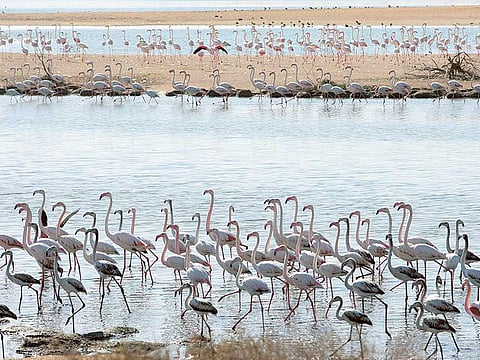Eye on Earth kicks off in the capital
Citizen science way towards better future, experts say

Abu Dhabi: Simple tasks such as measuring the level of noise and taking pictures of Nature in Abu Dhabi are some of the ways that individuals can collectively work towards environmental sustainability, experts in the capital said on Tuesday.
Speaking during the second edition of the Eye on Earth Summit 2015, specialists agreed that the planet is fragile and intrinsically in danger.
This year’s summit’s primary focus is on the need for open data on environment which officials revealed is often kept private due to political and financial reasons.
In fact, Dr Eyad Abumoghli, regional director and representative for the United Nations Environment Programme (Unep) Regional Office for West Asia (ROWA), said that the region’s heavy reliance on bureaucracy can be exhausting for those wishing to obtain information on any topic.
“There are usually a number of difficult steps required to obtain a certain piece of information in the Arab region, which I remember going through when I was obtaining my doctorate 25 years ago and this problem exists until today which is why we need to make this process simpler.”
Therefore, the Environment Agency Abu Dhabi (EAD) recently launched the Collector’s Application that allows Abu Dhabi residents to make use of their photographs for the betterment of the environment through the use of Geographic Information System (GIS). Wildlife in Abu Dhabi can be transformed from mere pictures into graphic representations on maps which is then updated in real time.”
This technique also allows individuals’ work to remain credited to them because of how traceable this data is, officials said.
Unfortunately, Dr Abumoghli added, data on environment is not given priority like information on poverty and education.
“Therefore, when countries begin to set their budgets, they do not take the environment into consideration as much as they would other topics.”
The first Eye on Earth Summit took place in 2011 where eight initiatives were launched — Eye on Network of Networks, Eye on Water, Eye on Oceans: Blue Carbon, Eye on Biodiversity, Eye on Community Sustainability and Resiliency, Eye on Disaster Management, Eye on Access4all and Eye on Environmental Education.
Commenting on the need for information and therefore the relaunch of the summit this year, Razan Khalifa Al Mubarak, secretary-general of the EAD, said that the need for data becomes more urgent as economies and societies witness an ‘exponential’ growth.
“Sustainable growth and development is the only way forward. The world needs to work together to pay back our ecological debt, especially as we strive to work toward the UN Sustainable Development Goals. Ensuring policy makers have the information they need to make informed decisions for sustainable development has long been the goal of the Abu Dhabi Global Environmental Data Initiative (AGEDI). Our support of the Eye on Earth movement and Summit will help advance our national efforts in transitioning to a more sustainable future and allow us to play a leadership role in this endeavour,” the official said.
Similarly, Jacqueline McGlade, Unep’s chief scientist and director of Early Warning and Assessment, told Gulf News: “Noise can cause developmental problems and even the lowering of IQ level in children, which is why equipping individuals to make use of their mobile phones, which are essentially noise detectors, can greatly help experts gather and analyse this information to hopefully secure a better future.”
Sign up for the Daily Briefing
Get the latest news and updates straight to your inbox


